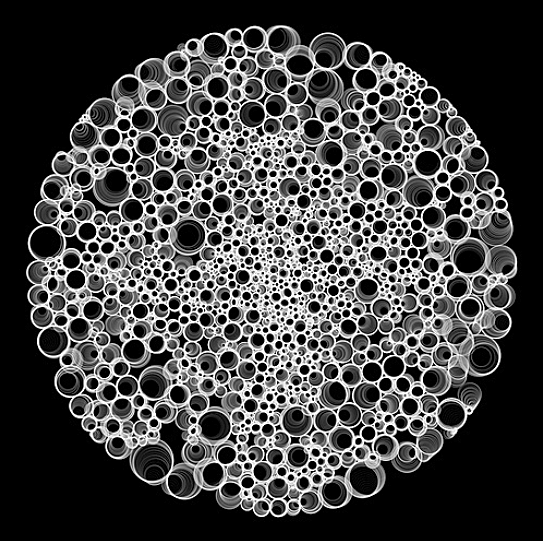Sometimes I feel I’m going in circles… the mind has me in a set way of thinking, tracks that lead me into repeating behaviors… habits… familiar ‘mind-sets‘ and biases. Problems I address using the same parameters, the same myopic perspective, the same value system that I’ve presumed as operating in this particular situation, even though it may not… It’s difficult to see passed the limits set up by my own way of looking at the problem. Someone said the definition of ‘crazy‘ is: “Doing the same thing over and over and expecting a different result.”
Often the way IN to the problem is relaxing the internal tension of it, letting go of its perceived borders, and seeing it as a ‘circle‘… held together by the internal tensions of the assumptions and feelings that compose it, and also held unvarying through time by the centrifugal spinning of the attention I give to it through repetition. I love what Rinpoche has to say about ‘circles’, because it applies to mind-space so sagaciously. Rinpoche says…
If we focus on the shape of zero, we find a line in the shape of a circle, a curving edge that connects only to itself. Inside the line is space, and outside the line is space: the edge is the edge between space and space, and so it is not an edge at all. This ‘edge that is no edge’ is the fitting symbol of space. From that perspective, every line that defines and gives shape is a symbol—space within, space without: an edge without substance. Every line, every shape returns to zero as the symbol of space. Every beginning, every ending, even every existent!
..….’Sacred Dimensions of Time and Space,’ Tarthang Tulku, p. 50“…suppose that you were able to journey to the edge of the universe and then return back home. As you told the tale of this journey, the question would come, “But what is beyond the edge?†If you answer that you do not know—that you reached the edge but could not go beyond—it is natural to ask, “Then how do you know it was really the edge?†The best available answer appears to be circular: “I know it was the edge because I could go no further.†That is how it is with reality. Beyond what we can measure, there may be axioms or speculations, but there is nothing to be known.
We could compare the absoluteness of this boundary to the nature of zero. Zero is not just something infinitesimally small; it is nothing at all. It is the unknown, the ‘x’ of experience, wholly unrelated to any physical occupancy.
Yet this way of putting the matter raises a difficult question. Though zero is separate from the physical, it must also somehow share a border with the physical. The whole idea of ‘different from’ or ‘separate’ actually presupposes some form of connection. Without such connection, ‘zero’ would simply be meaningless, and in that case ‘not-zero’ would be meaningless as well.
This same interplay operates in distinguishing matter from space.â€
….’Dynamics of Time and Space’, Tarthang Tulku, p. 268


David, I read your post with interest and appreciation.
Interestingly I read the sentence:
thinking it was your speculation; and so I felt empowered to question it, more than if I had realized it was Rinpoche’s. That seems a significant slip, since Rinpoche encourages us to do our own inquiry and not treat the TSK vision as his system or as created by any particular mind.
I have to imagine that the phrase “nothing to be known” is meant to be ambiguous and provocative, suggesting that there is a “nothing” that CAN be known, and not that there is a nothing that is isolated from knowing.
It seems that edges are meant to be traversed, if not physically, then creatively, imaginatively, appreciatively–since the beyond that seems to present us with a barrier can be known as a greater realm that allows us to be embodied in our own local one.
If we think of the ocean as the mother of our physical world, then its shoreline has been washed up by the action of the waves, thereby providing us with the sandy beaches and eroding rocks on which we can stand and from which we can peer out at Wittgenstein’s edge of the known. Whether we have travelled to the edge of the universe or not, we can view our own obstacles as convincing evidence that there is a beyond, which has washed up as the lives we are living.
Hi Michael,
Noting my affinity with circles I read your response numerous times… and found the repetitive focus rewarded me with a more encompassing understanding. And then, the context in which I understood seemed to open further… the circle lost its edge, it was a very full ‘sailing on‘ feeling. ☺ï¸